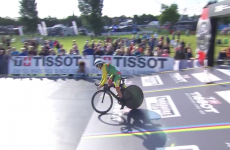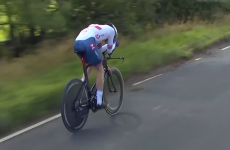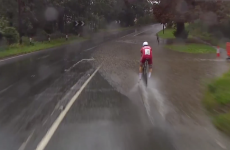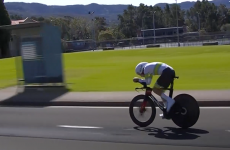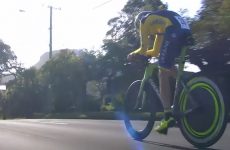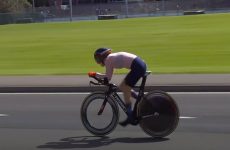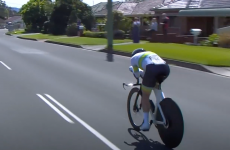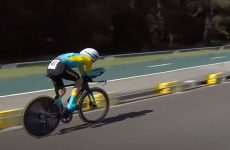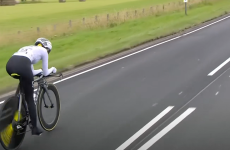Description
September 19, 2021
World Championships 2021 – Individual Time Trial MU23 ITT – Knokke-Heist – Bruges : 30,3 km
The UCI Road World Championships have been around since 1921 but for the first six years the event only consisted of a Men’s Amateur Road Race.
Show more...
September 19, 2021
World Championships 2021 – Individual Time Trial MU23 ITT – Knokke-Heist – Bruges : 30,3 km
The UCI Road World Championships have been around since 1921 but for the first six years the event only consisted of a Men’s Amateur Road Race. The first professional World Championships took place in 1927 in Nürburgring, Germany. The amateur road race continued to run alongside the professional race up until 1995 when it was then replaced with the more familiar U-23 event. Jerseys are an integral part of cycling, both as a sport and as a culture. Not only do they indicate a rider’s team affinity or national colours, they also denote achievement and accomplishment too. Wearing the rainbow bands of World Champion is perhaps the highest honour and achievement one can attain in the sport. This year’s UCI Road World Championships is set to be one of the toughest events in recent times. Held in Flanders, Belgium, the 2021 courses are some of the most attritional we’ve seen for a decade and should therefore favour the pure Classic specialists and born Flandriens.
Johan Price-Pejtersen (Denmark) added the world time trial title to his recent European title, winning the Under 23 men’s rainbow jersey with a time of 34:29 for the 30.3km flat course between Knokke-Heist and Bruges.
Luke Plapp (Australia) was an early starter and set the fastest time, putting him in the hot seat until last starter Price-Pejtersen beat him by ten seconds. Plapp, who will ride for Ineos Grenadiers in 2022, set a time of 34:39.
Florian Vermeersch (Belgium) finished fast to set a time of 34:41, beating Søren Wærenskjold (Norway) by two seconds to take the bronze medal. Price-Pejtersen rode for the Uno-X ProTeam in 2021 and will stay with the successful Norwegian squad in 2022 rather than stepping up to a WorldTour team.
“At the European championships I exploded a bit in the finish, so I thought it was better to do a controlled ride, with a negative split in the first section,” he explained.
“I had the advantage of starting last so I could see where my effort put me. I was told I was third and not far from the fastest time, so I knew I had to pick up the pace. I then gave it everything from the hard second split and pulled hard all the way to the end.”
Price-Pejtersen followed in the footsteps of fellow Dane Mikkel Bjerg, who won the Under-23 time trial title in 2017, 2018, and 2019. The event was not contested in Imola in 2020 due to the COVID-19 pandemic.
“In the past, I’ve been in the shadows of Mikkel because he’s been better than me and he’s also older than me,” Price-Pejtersen said.
“I could beat him sometimes but he was the best at the Worlds, so without him here I had a clear shot this time. I’m really satisfied I could step up and win.
“It’s good that Denmark won again, we’ve won five out of the last six World Championships and that’s important for the national team.”
How it unfolded
Logan Currie of New Zealand was an early starter and was first in the hot seat with a time of 35:29 for the pan-flat 30.3km course on straight roads across the marshlands between Knokke-Heist and Bruges.
The USA’s Magnus Sheffield was confirmed as Ineos Grenadiers’ latest signing as he rolled down the start ramp and rode on a team issue Pinarello Bolide time trial bike. The 19-year-old American started all-out and was faster than Plapp after 13km but then faded in the second half of the course and set a time of 35:28.
Plapp was also equipped by his future pro team and rode a controlled ride. The Australian national champion and team pursuiter was faster than Sheffield at the second split as he produced a faster ride in the second half to set a time of 34:39 to take the hot seat. Jumbo-Visma signing Mick van Dijke (Netherlands) was the next challenger, setting a time of 34:54 to join Plapp on the hot seats and watch their rivals in action as they began to threaten their times.
Off the pace were Finn Fisher-Black (New Zealand), who set a time of 35:35 and Carter Turnbull (Australia) who set 35:45. Like so many, they were unable to go below the 35-minute barrier. Great Britain’s Ethan Vernon was riding the Hope time trial for the first time at international level and was considered a medal contender. The cutting-edge bike perhaps helped him and he was fast at the first intermediate time check. However he faded slightly in the final 10km and set a time of 35:13. He replaced Sheffield on the third placed hot seat but only for a while and he eventually finished seventh at 43 seconds.
Belgian hopes sat firmly with Vermeersch and he was cheered around the 30.3km course. Vermeersch rode the Vuelta a Espana to build a solid endurance base of form and it proved useful. He was only two seconds slower than Plapp at the first time check, but slipped to seven seconds down after 21km. He finished very fast and stopped the clock in a time of 34:41. That was just 1.15 seconds lower than Plapp but secured him a place on the podium, even when Price-Pejtersen finished fastest.
Søren Wærenskjold (Norway) had been a threat to Vermeersch during his ride but faded massively in the final kilometres and finished fourth fastest, two seconds slower. Price-Pejtersen started behind Wærenskjold and was last down the Knokke-Heist start ramp overlooking the beach. He was second fastest at the first time split after 13km but was carefully pacing his ride and following a negative split strategy. He picked up his effort soon after and was only five seconds faster than Plapp after 21km. He held his speed and his nerve in the final section, virtually equalling Vermeersch’s split time of 10:35. He dug deep in the final kilometres and as he rode to the line, it was clear he had gained enough to dump Plapp off the hot seat and take the rainbow jersey.
Results :











